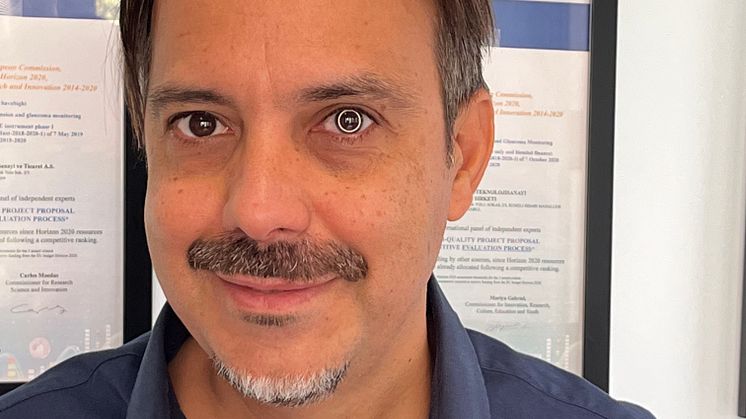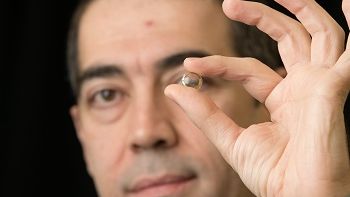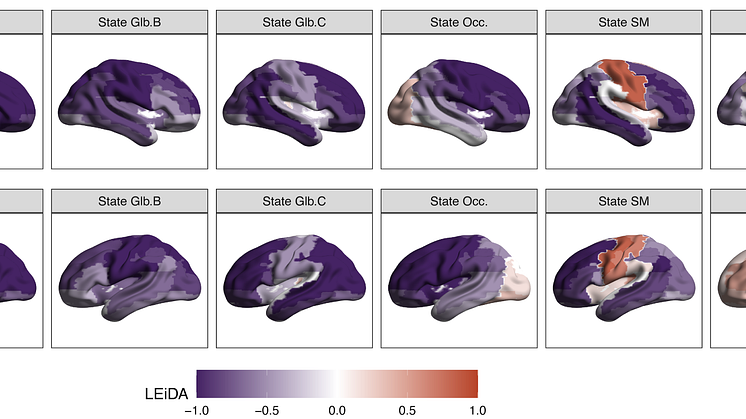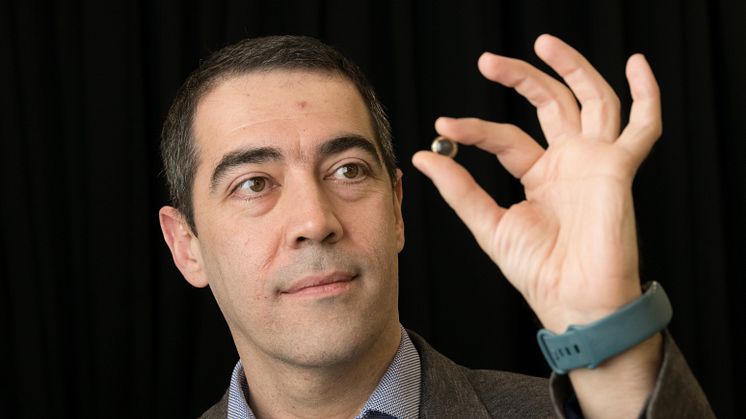
Press release -
Contact lenses to diagnose glaucoma
Glaucoma effects around 70 million people worldwide and can cause irreversible loss of vision if not treated – but around half of those living with the condition are not aware of it.
Usually developing slowly over time, many cases of glaucoma are only picked up during routine eye tests, by which time lasting damage may already have been caused.
But this could change in future as academics from the UK and Türkiye have developed a contact lens which can detect changes in eye pressure which signal possible glaucoma.
Glaucoma occurs when the optic nerve, which connects the eye to the brain, becomes damaged, usually by a build-up of fluid in the front part of the eye which increases pressure inside the eye – known as intra-ocular pressure (IOP).
The new contact lenses contain micro-sensors which monitor changes in IOP over a period of several hours, sending the data collected wirelessly so it can be analysed by an ophthalmologist and a diagnosis given.
The research has been carried out by Professor Hamdi Torun, of Northumbria University; and Professors Günhan Dündar and Arda D. Yalcinkaya, of Boğaziçi University, in Istanbul, and has been published in Contact Lens and Anterior Eye, the official Journal of the British Contact Lens Association.
Their paper, entitled A first-in-human pilot study of a novel electrically-passive metamaterial-inspired resonator-based ocular sensor embedded contact lens monitoring intraocular pressure fluctuations, sets out the findings from their initial pilot study of six participants.

Having determined that the technology works successfully, they now plan to carry out a further study with a larger group of participants, which will take place over the next year. The lenses will then be made commercially available through their spin-off company GlakoLens.
One of the benefits of using the GlakoLens contact lenses to diagnose glaucoma instead of carrying out a traditional examination is that measurements can be taken more easily over a longer period of time, giving a more accurate diagnosis.
As Professor Torun explains: “Intra-ocular pressure, or IOP, can vary greatly over a 24-hour period, so it is important to monitor the patient either at intervals or ideally continuously for a whole day to get the best insight into the health of their eyes.
“Traditional methods for measuring IOP involve initially going to a clinic for a single measurement in a day, the result of which can be misleading due to the natural variation of IOP.
“If a variation is detected, further investigation is then needed which requires hospitalisation for a whole day, during which repeated measurements are taken using a technique called Goldmann applanation tonometry, which involves numbing the eye with drops and then using a small cone to touch the cornea to measure the pressure.
“However, studies have shown that waking patients up at night to carry out measurements can make the results less accurate, in addition to obvious discomfort to the patients and the economic cost to the healthcare system.
“The benefit of the contact lenses we have developed is that once placed in the eye, the patient can then go about their day as normal while their IOP measurements are recorded and sent to a doctor for analysis once the 24-hour period of testing is complete.”
The new system has been tested with six healthy volunteers, during which time they were asked to drink 1.5 litres of water and lie flat to intentionally increase their IOP levels.
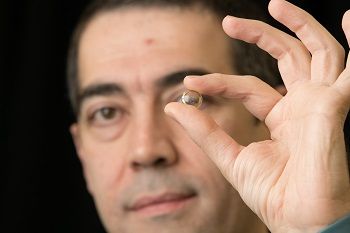
While this is not the first time contact lenses have been developed to measure IOP, previous products have used an electrically active silicon chip, which results in a thicker, less comfortable lens. The chip also makes the lens less flexible and can restrict vision, making it more difficult to carry out daily activities.
The GlakoLens contact lenses use an electrically passive sensor embedded in a disposable soft contact lens, and a wearable electronic readout system to collect, store and process the data – making the lens more comfortable and allowing the patient to go about their day as normal.
As well as diagnosing glaucoma, there is also potential for the lenses to be used to detect other health conditions by measuring glucose, lactic acid and other molecules present in eye.
As Professor Torun adds: “We believe this technology has huge potential and could not only save the sight of patients in the early stages of glaucoma but also provide early diagnosis of other diseases in future.”
Read the research paper published in Contact Lens and Anterior Eye in full here.
Topics
Categories
UNIVERSITY OF THE YEAR 2022 (Times Higher Education Awards)
Northumbria is a research-intensive university that unlocks potential for all, changing lives regionally, nationally and internationally. Find out more about us at www.northumbria.ac.uk
--- Please contact media.communications@northumbria.ac.uk with any media enquiries or interview requests ---








